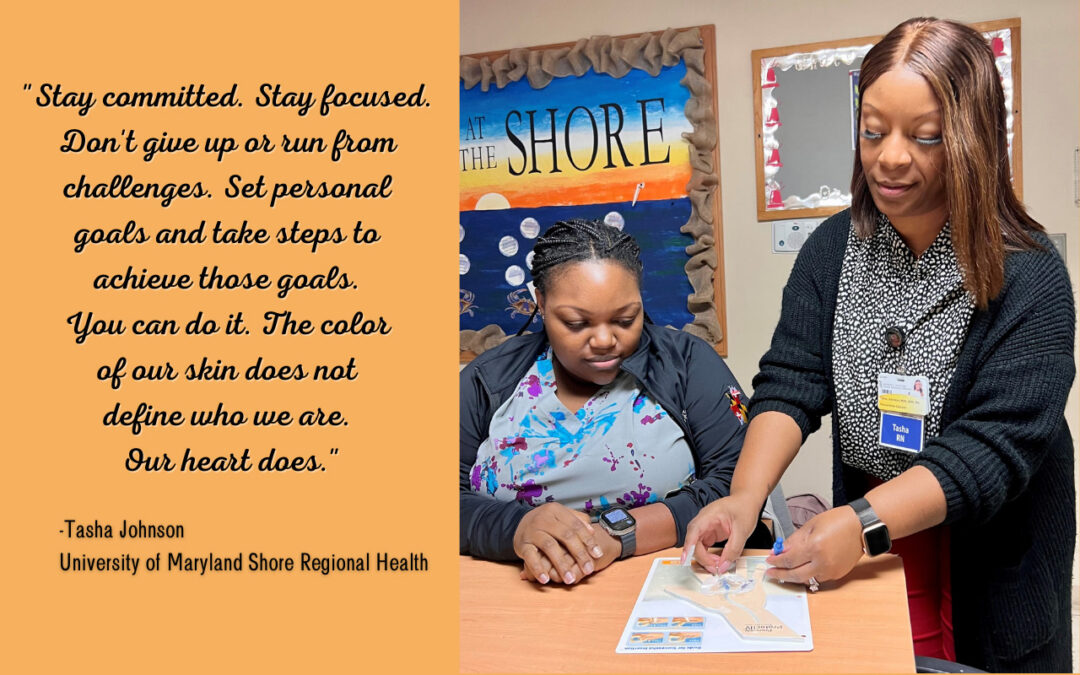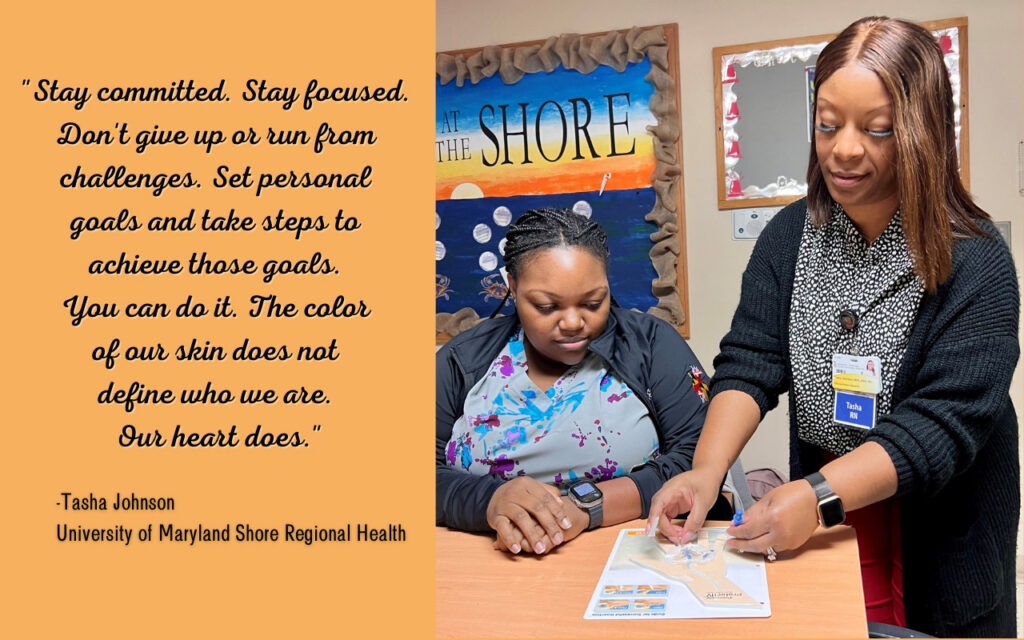Tasha Johnson, MSN, RN, is a clinical nurse educator and aligned AHA training center coordinator for the University of Maryland Shore Regional Health. Johnson is also a per diem administrative nursing supervisor and per diem staff nurse in the ICU.
Johnson is an important nursing leader, and we’re pleased to profile her as we celebrate Black History Month with the Black Nursing Leaders Series 2023.
In February, we’ll highlight healthcare leaders who are prominent figures in their organizations and are making transformational impacts in nursing.
Meet Tasha Johnson, a clinical nurse educator and aligned AHA training center coordinator for the University of Maryland Shore Regional Health.
How long have you worked in the nursing field?
I have been in the nursing field for 20 years – 14 years as a CNA and six years as a registered nurse. I have been with UMMS for seven years.
Talk about your career path and how you ascended to that role.
When I think about my path, I amaze myself. I allowed God to lead and guide my steps. It was and is not an easy path. However, you can do it if you stay focused and committed. I was not one of those people who knew from birth that I wanted to be a nurse. I knew I loved people and, most importantly, serving, helping, and inspiring others.
When it was time to apply for the nursing program, I received a denial letter, not realizing I had one more class to take before applying. I took that class applied again, and again I received a denial letter. At this point, I had already completed pre-req classes required for a BSN to “stay in school mode” and earned an associate of arts degree for those particular classes (earning more points to get into the nursing program). Angry, I threw the letter in the trash and gave up hopes of becoming a nurse. The guidance counselor asked me, “Don’t you want to pick another profession? Maybe nursing is not for you. How about radiology?” My husband told me to get the letter out of the trash and call after the the 4th of July holiday, when the college reopened, and see what was going on. I did, and I learned that my points were not calculated correctly. Technically I earned my acceptance letter, but instead, because of the mistake of calculating my points, nine students who had a seat would have had to give it up for me to get into the program.
Placed on a waiting list, it wasn’t until the third day of the nursing program starting, and I write this with tears of joy, that I received an email from the director of nursing in disbelief to offer me a seat in the program because someone could not continue. I was next in line to get in. Not only did I get into the nursing program, but I was the class president! I believe I am the first Black class president Chesapeake College has had. This motivated me to strive for positions to inspire other Black future nurses and nursing assistants by teaching and showing them how to truly care for patients in their vulnerable moments. I applied and was accepted into the Residency program here at SRH accepting a position in acute care in our Chestertown facility. I found a love for critical care during nursing school and, after serving a year in acute care, transitioned to help those in critical care. After achieving my BSN, this allowed me to operate in a teaching capacity at Chesapeake College as a clinical nursing instructor, a faculty member to teach one of the offered CNA courses, and a faculty member to teach patient care to the Rad Tech program. Scheduling a tour of the hospital for my CNA class with my current director, the Clinical Nurse Educator Role, was brought to my attention. I was ecstatic and jumped at the opportunity.
What inspired you to become a nurse?
I love serving and helping people. When you have a servant’s heart, you put yourself aside for someone else’s well-being. It brings my heart joy to be able to do this and see people get better, put smiles on their faces, and give hope.
What are the most important attributes of today’s nursing leaders?
Important attributes for today’s nursing leaders are professionalism, integrity, communication, and interpersonal skills. We work with many different types of personalities, races, age groups, and people with different socioeconomic backgrounds, and we need to strive for excellence and can do that by maintaining these attributes. As a Black nurse, especially in a leadership position, you will be judged or not taken seriously by some individuals, though the requirements to become a nurse are the same for all. Consistently and persistently upholding professionalism under challenging situations, demonstrating integrity, communicating well, and working well with others will help you stand out and eventually earn respect from your peers and patients.
What does it mean to you to be a nursing leader, and how are you making a difference?
Being a nurse leader is an honor because I feel Black nurses have to work harder to obtain leadership positions or the opportunity to be heard and make a difference.
I feel my position as a Black nurse leader gives other inspiring Black leaders hope and the courage to achieve their personal goals. Inspiring future nurses to share my journey and how I overcame challenges by staying professional makes a difference. Communicating well might seem small, but it makes a difference. Training new staff according to policy shows integrity and makes a difference. How you represent yourself is very important. As a leader meeting new people every week and day here at SRH, I can make a difference and crush stereotypes/biases placed on the Black community.
What is the most significant challenge facing nursing today?
The significant challenge Black nurses face today is extremely significant discrimination in the workplace. I knew discrimination and racism were true, but I did not experience or see it firsthand until I entered the healthcare profession.
As a nursing leader, how are you working to overcome this challenge?
It’s in my character to never back down from a challenge. Challenges, especially when leading to the challenge, increase my motivation to show that I can do it. I have been called the “N” word by patients. However, that still did not change the level of care I gave as if they were my family member. I have been denied positions for which I know I was qualified, but I kept a positive mindset. I may have to work harder to obtain leadership positions. However, when the time is right, and everything aligns correctly, the job, the money, and whatever else I desire with come. I keep a positive attitude. I have affirmations and scriptures before me at all times to keep me grounded and focused. On an organizational level, I’m hoping my voice will be accepted and heard to make a difference or changes by participating in leadership forums and being on committees.
What nursing leader inspires you the most?
The nurse leader who inspires me is Dyshekia Strawberry. Dyshekia is a nurse manager here at SRH for our Cardiac Catheterization Lab. I first met her when she was a clinical coordinator on one of our MedSurg floors, and it was when I got to know her when she was pursuing management here at SRH. She is a Black nurse leader manager. Always professional. She is never opposed to giving me wisdom or career advancement direction. She is smart and business-minded and cares for not only her patients but her staff as well. She elevated to the position she is in today with being a floor nurse, education, and now management, and that is so inspiring to me because I’m sure it was tough, but she kept pushing and going. When the time is right, I, too, would like to move into management, then director, then hopefully a CNO position.
What inspirational message would you like to share with the next generation of nurses?
Stay committed. Stay focused. Don’t give up or run from challenges. Set personal goals and take steps to achieve those goals. You can do it. The color of our skin does not define who we are. Our heart does. Your elevation journey is not a sprint. It’s a marathon. Be confident in your ability to succeed and motivated to achieve your goals.
Is there anything else you’d like to share with our readers?
I can’t express enough the gratitude I feel in my heart to not only share my journey thus far but to be able to share and inspire people on a national level. That is huge to me, and I’m so grateful and honored.
- Meet a Champion of Nursing Diversity: Kendra Coles - April 3, 2024
- Meet a Champion of Nursing Diversity: Barbara Bosah - March 13, 2024
- Tune Into New Podcast Series: Conversations About Health Care Delivery in the United States - March 7, 2024




